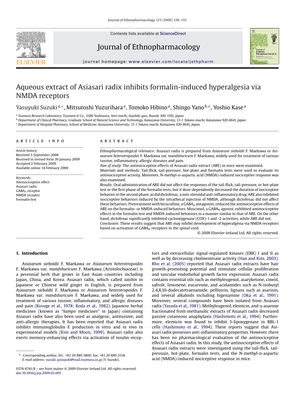Aqueous Extract of Asiasari Radix Inhibits Formalin-Induced Hyperalgesia via NMDA Receptors
February 2009
in “
Journal of Ethnopharmacology
”

TLDR Asiasari radix extract may relieve certain types of pain by affecting GABA and NMDA receptors.
The study examined the pain-relieving effects of Asiasari radix extract (ARE) on mice with formalin-induced hyperalgesia, focusing on the second phase of pain response. ARE was found to reduce the duration of pain behavior in this phase without affecting the first phase or responses in other pain tests. The effects were similar to those of diclofenac, an NSAID, but ARE did not inhibit COX enzymes, indicating a different mechanism of action. The antinociceptive effects of ARE were blocked by a GABA antagonist, suggesting that ARE works through GABA receptors. The study concluded that ARE might inhibit hyperalgesia by activating GABA receptors and interfering with NMDA receptors. The study used eight mice per dosage for ARE and diclofenac, and nine mice for the COX activity test with diclofenac.





